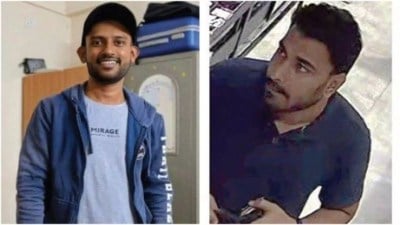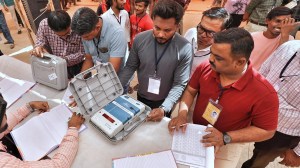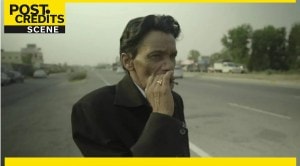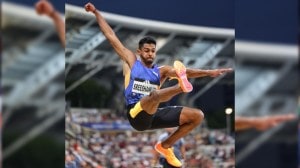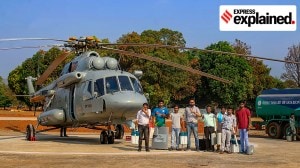- India
- International
Her turn – In a first, women are being hired for Military Police in Indian Army
For the first time, women are being hired for Corps of Military Police in the Indian Army. At the Belagavi recruitment centre in Karnataka, over 800 have competed for barely 100 places in history. MAYURA JANWALKAR found young women and parents determined to let little come in their way — from chicken pox to rejection, salwar-kameez to no running shoes.
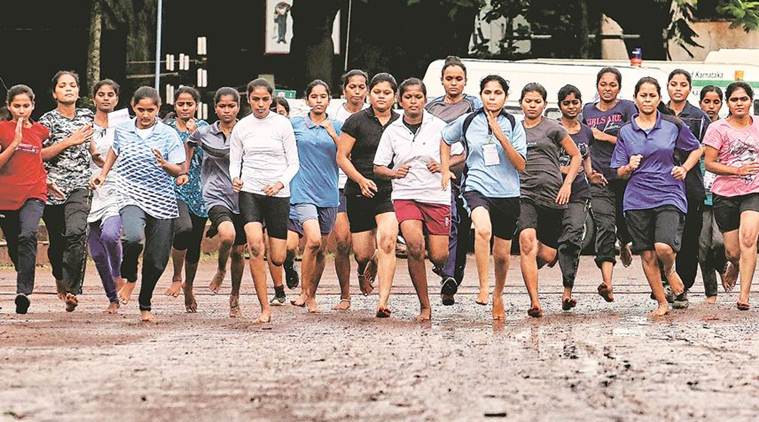 With floods hitting Belagavi hard, there were unexpected showers on all days of the recruitment rally, and many ran their races bare feet. (Express photo: Amit Chakravarty)
With floods hitting Belagavi hard, there were unexpected showers on all days of the recruitment rally, and many ran their races bare feet. (Express photo: Amit Chakravarty)
Nothing, not even the angry, red eruptions on her face and body, will stop Sneha N S from aiming for her “dream job”. “I love the Indian Army,” says the 18-year-old, chin cupped in her palm as she sits by herself under one of the three large canopies at the Chhatrapati Shivaji Stadium of the Maratha Light Infantry Regimental Centre in Belagavi, Karnataka. Outside the enclosure, around 35 women run on the 400-m track that’s glistening after a sudden, heavy shower.
A day earlier, Sneha had cleared her ground tests — a 1.6-km race that had to be completed in eight minutes or less, high jump and long jump — and physical fitness tests, when she was diagnosed with chickenpox. Now on medication for the pox, she is back at the stadium for a medical examination as part of the recruitment process. As she waits for her turn, isolated from the other women, Sneha, dressed in a navy blue T-shirt and track pants, a white thorthu tossed across her shoulder, says, “I had no fever when I left home in Kerala. Even when I reached Belagavi and got these pimples, I did not think much of it. So I came for my physical and ground tests.”
Accompanied by her mother and uncle, Sneha, who is pursuing a computer course in her hometown Iritty, about 41 km from Kannur, made the 611-km journey from home to Belagavi even as she was coming down with the infectious disease, spending eight hours in a bus and three hours on a train. She is among the 850-odd women, many of whom have travelled several hundred kilometers, to turn up at the first-ever recruitment rally for women to the Indian Army’s Corps of Military Police.
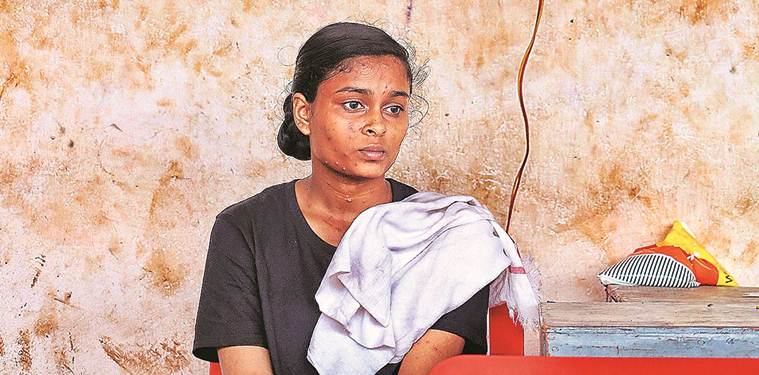 Sneha N S was diagnosed with chicken pox after clearing her ground and physical tests. (Express photo: Amit Chakravarty)
Sneha N S was diagnosed with chicken pox after clearing her ground and physical tests. (Express photo: Amit Chakravarty)
The recruitment of women as Soldier General Duty (Women Military Police) marks the first time that women will be taken in not only as officers, but as soldiers, giving them an opportunity to be involved in active military duties. As personnel of the military police, the women soldiers will be responsible for investigating offences such as molestation, theft, and rape; “assisting in the maintenance of good order and discipline”; and in custody and handling of prisoners of war — essentially combat-support operations.
The move is part of a slow opening up of avenues for women in the armed forces. In his Independence Day speech last year, Prime Minister Narendra Modi had said women officers recruited into the armed forces under the Short Service Commission would be given the option of taking up permanent commission — a “gift” to India’s “brave daughters”.

Following a notification issued by the Army on April 25, around 15,000 women registered for the recruitment rally at Belagavi, the first of five such to be held across India to fill 100 positions in the Military Police. The Belagavi centre catered to candidates from the southern states of Karnataka, Kerala, Tamil Nadu, Andhra Pradesh and Telangana and the Union Territories of Lakshadweep, Andaman and Nicobar and Puducherry. Of the 15,000 aspirants, about 3,000 were short-listed on the basis of their Class 10 marks, with the cut-off set at 86 per cent. Of the shortlisted candidates, only about one-third turned up at the Belagavi centre between August 1 and 5 at the date and time assigned to them. Just then, outside the enclosure where Sneha is sitting, a shrill whistle pierces the air and another batch of girls takes off — feet on the wet ground, mostly bare, making a dash for their place in history.
“Does everyone understand English?” asks Major Sneha Chaudhary and the group of about 30 women, sitting on red carpets spread out on the ground in one of the enclosures, bellow in unison: “Yes”. “If anybody touches you inappropriately… Does everyone understand what ‘inappropriately’ means? If somebody touches you in a bad way, you can come and tell me or any other woman staff here,” continues Major Chaudhary. “With increased awareness, it has become easier to talk to women candidates about these things (sexual harassment). They are not taboo anymore. While we have minimised physical contact between the candidates and male officers and everything is transparent and open, we still have to brief them about gender issues,” a senior Army officer says later.
After the briefing, the girls, one of four groups, are led to the starting line of the running track for the first of their challenges — four laps of a 400-m track. The whistle goes off and seconds later, gliding ahead in an orange jersey is P Mounika, 19, a national-level sprinter from Visakhapatnam. After finishing first in her group, the hazel-eyed athlete says, “I want to serve the country and the military is my passion. If I don’t get selected the first time, I will try again… and again and again.”
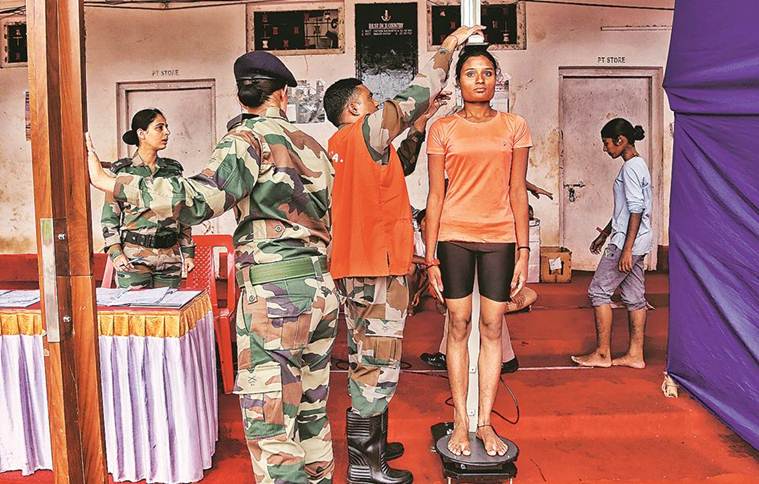 The women had to be at least 152 cm in height to qualify. (Express photo: Amit Chakravarty)
The women had to be at least 152 cm in height to qualify. (Express photo: Amit Chakravarty)
After the race, there are more ground tests — long- and high-jumps — after which the candidates are sent for physical tests to assess if they meet the required height, weight and chest-expansion criteria. Those who qualify proceed for medical examination the following day, where candidates undergo both routine and, if required, specialised screenings.
Army sources said candidates who clear the medical examination will sit for a written test in October, results of which are expected to be declared by the second week of November. Those selected will finally undergo a 33-week training session at the Corps of the Military Police Centre and School in Bengaluru, to be attested in the rank of sepoy. According to officials, those selected as Soldier General Duty will start at a salary of Rs 37,000- Rs 39,000 — including their basic salary and various allowances — on a par with their male colleagues.
As she oversees the physical tests, Major Himika Kalyani says what shines through the whole exercise is the spirit of the young women. “Most of them were running bare feet. The fastest runner we saw clocked under six minutes to complete the 1.6-km run,” says Major Kalyani, in between instructing some of the women to untie their hair for accurate height measurement.
Outside the gates of the centre, eager parents and relatives have been waiting for their children since morning. As Amikha K, 18, walks out of the gates of the centre after clearing her ground and physical tests, her father Gopi K, who has been waiting with other parents since morning, greets her with a spontaneous hug and a peck on the cheek. Gopi, a driver with the Kerala State Road Transport Corporation, and his wife Dhanya T, a bank employee, had accompanied Amikha from Kozhikode to Belagavi. “We would have been happy with anything our daughter wanted, but the Indian Army is the best,” says Gopi, after he has taken a selfie with his wife and daughter.
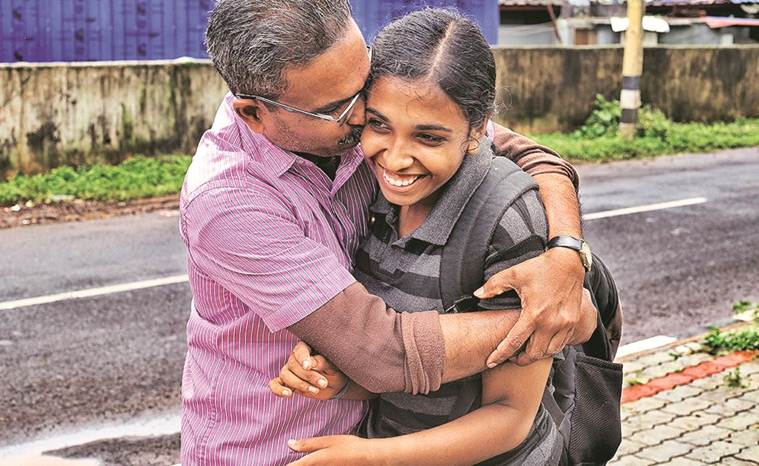 Amikha K, who cleared her tests, is greeted by her father with a spontaneous hug. (Express photo: Amit Chakravarty)
Amikha K, who cleared her tests, is greeted by her father with a spontaneous hug. (Express photo: Amit Chakravarty)
Traipsing behind them are kabaddi players Amrutha P K and Safa Ameena, both 19. The athletes had both passed the physical tests, but with Amrutha missing the 86% cut-off in her Class 10 exams by half a decimal, she will now have to head back to Thrissur. Ameena, who had to stand up to her conservative family before leaving for Belagavi, arrived for the recruitment rally with Amrutha and her father. She is now bracing for more battles: “I am worried I may be 4 kg overweight, but other candidates have been saying the weight criterion is not as strict as the one for height (candidates have to be at least 152 cm tall). So I am hopeful.” The rules only say weight should be “proportionate to height and age as per Army medical standards”.
Belagavi, a city near the Maharashtra-Karnataka border that’s usually caught in a ferment of border and language politics, is now crawling with women between the ages of 17.5 and 21 (the age criterion set for the recruitment process) and their dreams of donning the Army fatigues some day. Seated at a local restaurant with their fathers are Arshitha S, a national-level sprinter, and Karthika S, a state-level runner, enjoying chicken and Kerala parotta, a hard-earned meal since they had both cleared the physical and ground tests. “The uniform,” says Karthika about what drew her here. She then runs her index finger on her shoulder and says, “the stars… I love it.”
Arshitha’s father Sivan K is a JCB driver in Palakkad and Karthika’s is an auto-rickshaw driver. For the last four days, the two men, their daughters and Arshitha’s cousin have packed themselves into a room with green walls at the modest Vrindavan Lodge in Belagavi’s Ravivar Peth, sharing a double bed and two mattresses on the floor. The journey fare, the daily room tariff of Rs 1,200 and the food bills have not been easy on his pocket, but Sivan feels it will be worth his every hard-earned rupee if Arshitha is among the first women in the Military Police.
“If they were going to send women to the border, I don’t think I would have let my daughter go. But this could also be an office job… She should take up whatever posting she gets but we will be happy if it is closer home,” he says.
Not far from from the Vrindavan Lodge, the 12 rooms at Pushpa Lodge too have seen young women and their families check in and out over the last four days. In one of its rooms are M Paavani from Secunderabad, Telangana, and A Ruksana from Guntakal, Andhra Pradesh, residents of what was once a united state and who have now bonded over that larger region and language. They had met at the Belagavi railway station and decided to share a room and split the tariff. That’s how the room, with two single beds, a TV set and an attached bathroom, came to be occupied by Paavani, her cousin Bharat Kumar, Ruksana and her mother Sharifa.
The daughter of farm labourers, Paavani, who passed her Class 12 in the science stream, says she missed a constable’s job in the Telangana Police by one mark. This time, she is more hopeful. A day ahead of their ground and physical tests, Ruksana is confident. “Deshbhakti (patriotism),” she says, when asked why she wants to be in the Army. Her burqa-clad mother Sharifa, who tailors women’s clothes back in her village, only says she is happy with her daughter’s choice.
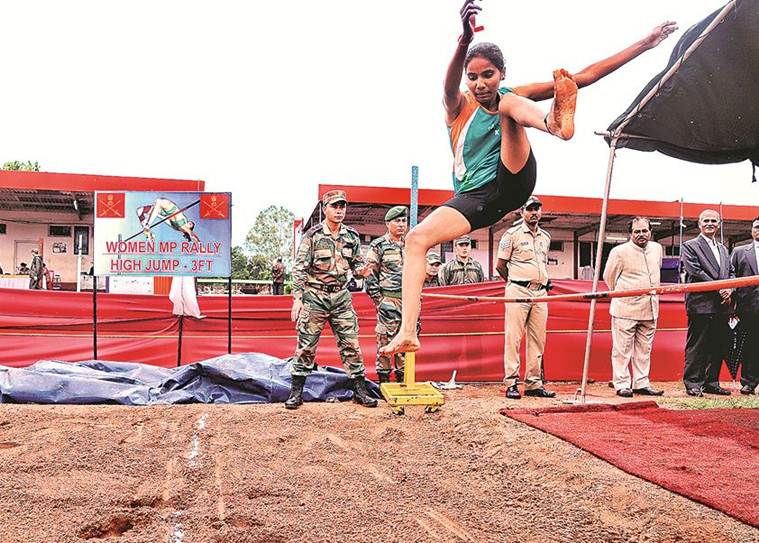 As part of the ground tests, candidates ran a 1.6-km race and competed in high jumps and long jumps. (Express photo: Amit Chakravarty)
As part of the ground tests, candidates ran a 1.6-km race and competed in high jumps and long jumps. (Express photo: Amit Chakravarty)
The five days of the recruitment rally were preceded by two months of brainstorming, consultations, meticulous planning and exercise of “abundant caution”, say senior Indian Army officers. Brigadier Dipendra Rawat, Deputy Director General, Zonal Regional Office, Bengaluru, who led the planning and organisation of the rally, says, “Our aim was to make everything transparent and comfortable for the young women. For the physical and ground tests, we wanted enough eyes on the ground to see these tests taking place. For the medical examination, we consulted our women officers and our male officers talked to their wives to ensure we were ready with even the smallest of things that these women may have required.”
Given the experience local police have in conducting recruitment rallies for women, they too were roped in for the consultations. Two women Majors from Bengaluru and one Captain from the Military Nursing Services were called in to conduct the ground and physical tests, and two women doctors were stationed at the ground. The Chhatrapati Shivaji stadium, with its fortress-like crenellated boundary wall, its Camp Shivneri gate and the Military Hospital were fitted with 16 CCTV cameras. A drone camera hovered over the running track and recorded the ground tests. A changing room was made available for the women, some of whom arrived in salwar-kameez, slippers, anklets and head-scarves, to change into their athletic wear.
About 60-70 members of the administrative staff of the Maratha Light Infantry Regimental Centre, which hosted the recruitment rally, were also deployed for arrangements on the ground — erecting tents and organising catering services as candidates were given breakfast after the physical and ground tests. The district administration of Belagavi pitched in with mobile toilets that were placed behind the ‘marshalling area’ where the women assembled. The administration and the Army also arranged five buses to pick up candidates from the Belagavi station.
In the course of their planning, Army officials also procured from the Indian Meteorological Department statistical rainfall data for August for the last five years. “The IMD data did not indicate heavy rain in this period but it rained on all days,” says an Army officer. Belagavi is the worst-affected district in the recent Karnataka floods.
The unexpected rain forced them to make improvisations as they went along. “We would start the running test only when the rain abated. However, the candidates were told that if it rained in the middle of the race, they couldn’t stop,” he says. The rain even prompted the Army officials to install three heaters inside the enclosures at the stadium since many of the candidates came back drenched.
As they arrived at the centre, women candidates were asked to write down the name and phone number of a family member who accompanied them to Belagavi. “On the first day, one candidate felt breathless after the ground tests. We took her to hospital and she felt better but after that incident, we realised we needed these contact numbers to inform their families. In the case of male candidates, there are usually at least five-six who come from the same village and if any of them falls sick, the others look after him. So we’ve never had to do this for them,” says Colonel Praneet Dangwal, Director (Recruitment)at the Army Recruitment Office, Belagavi
The candidates sprung surprises too. Says a senior Army official, “After the physical tests, one girl came up to me and said, ‘Sir, can I please take a selfie with you?’ I said no, you can’t because you will put it up on social media. She said she wouldn’t. But then, as an afterthought, she said, ‘Actually sir, I will’. They aren’t inducted yet so they don’t understand hierarchy or protocol. For them, I am just another uncle.” Half a kilometre from the rally ground is the Military Hospital, the Out Patient Department of which has been shifted to another building to make way for the medical examinations of the candidates.
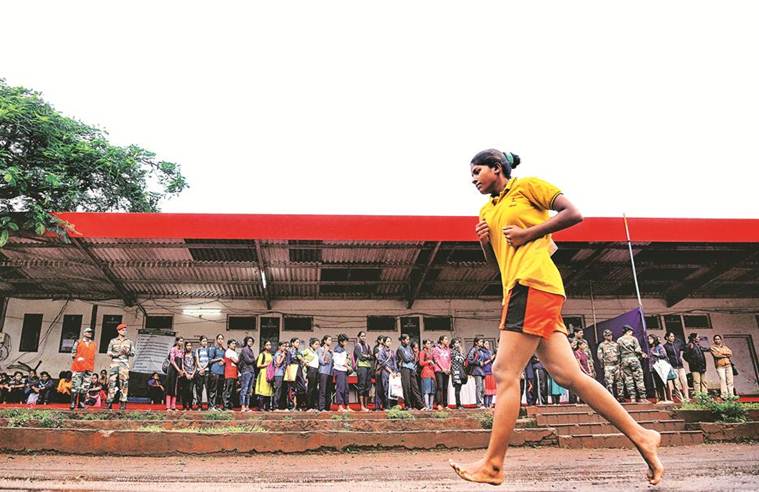 At the Maratha Light Infantry Regimental Centre in Belagavi, where over 850 candidates turned up for the first of five recruitment rallies for inducting women into the Military Police. (Express photo: Amit Chakravarty)
At the Maratha Light Infantry Regimental Centre in Belagavi, where over 850 candidates turned up for the first of five recruitment rallies for inducting women into the Military Police. (Express photo: Amit Chakravarty)
Apart from regular screening of eyes, ears, bones, and checks for physical deformities, the candidates had to go through an ultrasound of the pelvis — one of the conditions stipulated is that candidates should not be pregnant and “must undertake not to marry until they complete their full training”.
Among the special procurements for the medical examination were 10 navy-blue gowns, especially stitched for the women candidates. “The hospital does have gowns for women patients but we felt we need to have ones with the right opacity so that candidates feel comfortable changing into them. So we kept them as dark and thick as possible,” says a senior Army officer.
As the girls compete to shatter another glass ceiling, there are many who will have to wait for their chance. At the Belagavi railway station, eight young women from Maharashtra’s Osmanabad sit on the floor. Sporting track pants and T-shirts, hair pulled back in buns, they have laid out old newspaper sheets and are sharing the bhakri, pickle and puffed rice they had packed from home before they set out on the 600-km journey to Belagavi.
Now they are on their way back. “We didn’t know we had to register online before coming here. Also, we didn’t know that the recruitment rally for candidates from Maharashtra will be held in Jabalpur (Madhya Pradesh). But it’s okay. We will go there. We are determined,” says Nikita Panchal, 18.
Like the girls from Osmanabad, Nisha Anjum from Harihara in Karnataka’s Devanagere district showed up in Belagavi without registering online. But unlike them, the 19-year-old will have to wait longer for another chance. “I always wanted to serve the country… joining the Army meant everything to me,” says the burqa-clad Anjum. “But there is one more thing. I am the eldest of three daughters. My father always wished for a son. I wanted to show him that I was no less. Here was my chance and now it has all come crashing down now. But I will try again next year.”
Sushma Gaikwad, 19, had her documents in order, had impressed the officers with her performance in the ground tests, but when she stood against the ruler of the stadiometer, her heart sank — she was 150 cm, 2 cm short. As she waits for a train back home to Takli Big village, in Telangana’s Nizamabad district, Gaikwad, daughter of a banana farmer, says, “An Army job or nothing… There is one Armyman in our village. Everyone looks up to him. Why can’t a girl be like that? I wanted to show the people of my village that a girl can also be a role model. But I won’t be disheartened. I will come back next year.”
Apr 18: Latest News
- 01
- 02
- 03
- 04
- 05











